how to google scholar engine ,introduction the steps in English
谷粉学术怎么引用参考文献

谷粉学术怎么引用参考文献谷歌学术是一个非常有用的学术搜索引擎,它可以帮助研究者找到相关的学术文献和参考文献。
本文将介绍如何在研究中适当引用和参考文献,以保证学术诚信性和合规性。
## 引言在进行研究时,引用参考文献是非常重要的,它可以展示你对相关研究的了解,也能够支持你的观点和实验结果。
同时,适当地引用参考文献还可以避免抄袭问题,保证学术诚信。
## 引用格式在引用参考文献时,需要按照学术规范使用适当的引用格式。
常见的引用格式包括APA、MLA和Chicago等。
在谷歌学术中搜索到的文献通常已经提供了标准的引用格式,你可以直接复制使用。
如果你无法找到标准格式,可以参考相关学术期刊的引用要求,或者使用在线引用生成工具来自动生成合适的引用格式。
## 引用示例下面是一些引用参考文献的示例,其中包括书籍、期刊文章和会议论文等不同类型的文献:1. 书籍:Smith, J. (2000). Introduction to Research Methods. New York: Academic Press.2. 期刊文章:Johnson, A., & Brown, B. (2015). The impact of climate change on agricultural production. Journal of Agricultural Science, 20(3), 45-60.3. 会议论文:Liu, S., & Wang, Q. (2018). A comparative analysis of machine learning algorithms for image recognition. Proceedings of the International Conference on Artificial Intelligence, 234-245.## 参考文献列表在你的研究论文、报告或论文中,都需要提供一个参考文献列表,列出你引用的所有文献信息。
Google 学术搜索及其检索技巧
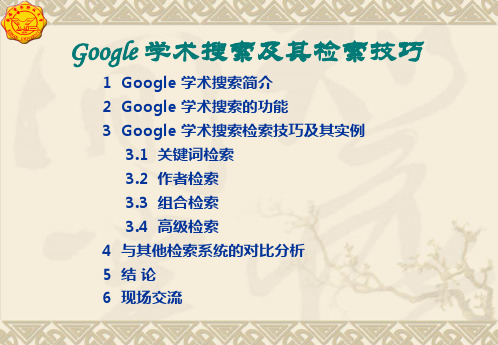
4 与其他检索系统的对比分析
CNKI跨库检索系统的对比分析 1 与CNKI跨库检索系统的对比分析
Google 学术搜索与 学术搜索与CNKI跨库检索系统相比,搜索范围更 跨库检索系统相比, 跨库检索系统相比 大,搜索速度更快,具有引文检索功能;但检索功能不及CNKI 搜索速度更快,具有引文检索功能;但检索功能不及 灵活,没有第一作者检索功能,也没有作者单位检索功能。 灵活,没有第一作者检索功能,也没有作者单位检索功能。
3.4
高级检索
操作符” 通过添加优化搜索字词的 “操作符”,可以提高在 Google 学术搜索上进行搜索的准确性和有效性。在某些情况 学术搜索上进行搜索的准确性和有效性。 学术搜索的搜索框中添加操作符; 下,可以直接在 Google 学术搜索的搜索框中添加操作符;有 时,需要使用“高级学术搜索”页。 需要使用“高级学术搜索” 学术高级搜索具有较强的组配检索功能,可以根据需要选 学术高级搜索具有较强的组配检索功能, 择使用:在查找文章时,可以限定检索词包含全部字词、 择使用:在查找文章时,可以限定检索词包含全部字词、包含 确切的词语、包含至少一个字词、 确切的词语、包含至少一个字词、不包含字词以及出现搜索字 词位置(文章中任何位置、位于文章标题),还可以限定作者、 词位置(文章中任何位置、位于文章标题),还可以限定作者、 ),还可以限定作者 出版物和日期。例如, 出版物和日期。例如,检索段宝岩发表在中国机械工程上的有 关射电望远镜的论文,可以如下输入信息: 关射电望远镜的论文,可以如下输入信息:
3.2 作者检索
输入加引号的作者姓名: 段宝岩” 输入加引号的作者姓名:“段宝岩” 或者 “Duan Baoyan”。要增加结果的数量,请不要使用完整的名字,使用首字 。要增加结果的数量,请不要使用完整的名字, 母即可, 母即可, 如“Duan B Y” 。 如果找到太多提及该作者的论文,则可以使用 "作者:" 作者: 如果找到太多提及该作者的论文, 操作符搜索特定作者。例如, 作者: 段宝岩"] "]、 操作符搜索特定作者。例如,可以尝试 [作者:"段宝岩"]、 Bao作者: "]。 [作者:" Duan Bao-yan "] 或 [作者:" Duan B Y "]。 作者: 如果还是不满意?请尝试高级搜索功能。有关详细信息,请参 如果还是不满意?请尝试高级搜索功能。有关详细信息, 阅高级搜索技巧。 阅高级搜索技巧。 相关检索结果如下图所示。 相关检索结果如下图所示。
谷歌学术批量导出参考文献

谷歌学术批量导出参考文献
谷歌学术是全球范围内最常用的学术搜索引擎之一,提供了大量的学术文献资源。
在研究、学习和写作过程中,我们常常需要将查找到的文献导出并整理成参考文献,以便于后续的使用。
本文将介绍如何使用谷歌学术进行批量导出参考文献的方法。
一、登录谷歌学术
首先,我们需要在谷歌学术官网上进行登录,只有登录后才能进行后续操作。
二、检索文献
在谷歌学术首页,输入关键字进行文献检索。
可以使用引号来缩小检索范围,也可以使用“filetype:pdf”来仅检索PDF格式的文献。
三、添加参考文献
当我们找到所需文献后,可以将其添加到“我的文献库”中。
在每个文献的右下角,会有一个图标,点击后会出现“导入至我的文献库”的选项,单击该选项即可成功添加文献。
四、导出参考文献
添加完文献后,在页面右上方,点击“我的文献库”,即可进入文献库页面。
在该页面中,我们可以对已经添加的文献进行管理和导出。
要批量导出文献,我们可以先勾选需要导出的文献,然后点击页面上方的“导出”按钮。
在弹出的窗口中,选择需要导出的文献格式,比
如“Bibtex”、“Endnote”等,最后点击“导出”即可将所有文献导出。
五、总结
使用谷歌学术批量导出参考文献十分简单,只需要进行基本的文献检索、添加和导出操作即可。
这对于研究和学习过程中的文献整理和阅读具有非常实用的意义。
希望通过本文的介绍,可以帮助大家更好地利用谷歌学术资源。
google学术搜索技巧

按作者搜索:尽量使用首字母而不要使用全名,因为Google 学术搜索编入索引的某些来源仅提供首字母输入加引号的作者姓名:"d knuth"。
要增加结果的数量,请不要使用完整的名字,使用首字母即可。
使用"作者:"操作符搜索特定作者。
例如,您可以尝试[作者:"knuth"]、[作者:"d knuth"]或[作者:"donald e knuth"]。
作者可以不加“”,其结果相同。
搜索[friedman regression] (弗里德曼回归)会返回以“regression”为主题的,由名为“Friedman”的人撰写的文章。
如果您想搜索某位作者的全名或姓氏及首字母,则输入加引号的姓名:[“jh friedman”]。
如果某个词既是人名也是普通名词,您最好使用“作者:”操作符。
该操作符只影响到紧挨其后的搜索字词,因此“作者:”和搜索字词之间不能有空格。
[flowers - 作者:flowers] 会返回关于花的文章,而忽略由名为“Flowers”的人撰写的文章按标题搜索输入加引号的论文标题:"A History of the China Sea"。
Google 学术搜索会自动查找此论文以及提及此论文的其他论文相关文章”链接:点击多个结果旁边显示的“相关文章”链接,您可以看到这些文章的列表。
对列表中的相关文章进行排名时主要依据的是这些文章与原始结果的相似程度,但也考虑每篇论文的相关性。
找到一系列相关的论文和书籍通常是新手熟悉某个主题的最佳方法出版物限制该选项只适用于高级学术搜索页为了得到完整的搜索结果,您需要对同一出版物多尝试几种拼写方法。
"标题:"操作符如[标题:mars] 得到的结果只包括文件名中的搜索字词。
短语搜索只返回包括这一确切短语的结果,如["随你便"] ,要加引号"OR" 操作符返回包括搜索字词之一的结果,如[股票看涨期权OR 看跌期权];。
Scholar学术搜索引擎

Google Scholar学术搜索引擎
谢谢!
请批评指正!
Google Scholar学术搜索引擎
Google Scholar检索技巧及举例
– 简单检索,布尔逻辑,强制检索(适用于高频词)
Google 默认逻辑“与”的关系(空格)
– 高级检索,文章、作者、出版物、日期 – 利用Google Scholar的服务功能
导入Endnote 电子邮件提醒 检索结果可以方便地链接到合作图书馆
Google Scholar及其它学术搜索 引擎的使用
王保成
学术搜索引擎,助科研一臂之力 Google Scholar,检索原来这么简单 您不知道的其它学术搜索引擎
Google Scholar学术搜索引擎
学术搜索引擎,助科研一臂之力
– 什么是学术搜索引擎?
专门用于检索因特网上的学术信息
– 学术搜索,科学研究中无法绕开的过程
Google Scholar学术搜索引擎
情景设计
– 查找有关低碳经济方面的相关学术文献 – 非欧洲非美国低碳经济方面的工作(-) – 查找近10年美国的低碳经济工作 – 查找某特定作者或者特定文献类型的对于低碳经济 的论述(作者,filetype) – 在特定的站点查找关于低碳经济方面的工作(site)
Scirus 学术搜索引擎
– 互联网上最全面、综合性最强的科技文献搜索引擎之一 – 由Elsevier科学出版社开发,2001年4月推出 – 可检索超过3亿个条目,检索结果包括预印本、专利、网页等 – 有Scirus工具条可以免费下载安装 – 提供一些相关的新闻条目
Google Scholar学术搜索引擎
Google Scholar学术搜索引擎
对检索式设置电子邮件 提醒 Nhomakorabea相关文献的引用记录
如何使用google搜索学术资源
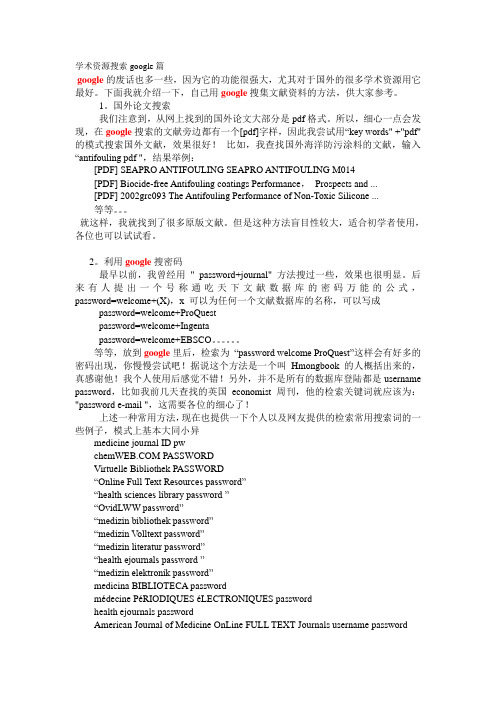
学术资源搜索google篇google的废话也多一些,因为它的功能很强大,尤其对于国外的很多学术资源用它最好。
下面我就介绍一下,自己用google搜集文献资料的方法,供大家参考。
1。
国外论文搜索我们注意到,从网上找到的国外论文大部分是pdf格式。
所以,细心一点会发现,在google搜索的文献旁边都有一个[pdf]字样,因此我尝试用“key words" +"pdf" 的模式搜索国外文献,效果很好!比如,我查找国外海洋防污涂料的文献,输入“antifouling pdf ",结果举例:[PDF] SEAPRO ANTIFOULING SEAPRO ANTIFOULING M014[PDF] Biocide-free Antifouling coatings Performance,Prospects and ...[PDF] 2002grc093 The Antifouling Performance of Non-Toxic Silicone ...等等。
就这样,我就找到了很多原版文献。
但是这种方法盲目性较大,适合初学者使用,各位也可以试试看。
2。
利用google搜密码最早以前,我曾经用" password+journal" 方法搜过一些,效果也很明显。
后来有人提出一个号称通吃天下文献数据库的密码万能的公式,password=welcome+(X),x 可以为任何一个文献数据库的名称,可以写成password=welcome+ProQuestpassword=welcome+Ingentapassword=welcome+EBSCO。
等等,放到google里后,检索为“password welcome ProQuest”这样会有好多的密码出现,你慢慢尝试吧!据说这个方法是一个叫Hmongbook 的人概括出来的,真感谢他!我个人使用后感觉不错!另外,并不是所有的数据库登陆都是username password,比如我前几天查找的英国economist周刊,他的检索关键词就应该为:"password e-mail ",这需要各位的细心了!上述一种常用方法,现在也提供一下个人以及网友提供的检索常用搜索词的一些例子,模式上基本大同小异medicine journal ID pw PASSWORDVirtuelle Bibliothek PASSWORD“Online Full Text Resources password”“health sciences library password ”“OvidLWW password”“medizin bibliothek password”“medizin V olltext password”“medizin literatur password”“health ejournals password ”“medizin elektronik password”medicina BIBLIOTECA passwordmédecine PéRIODIQUES éLECTRONIQUES passwordhealth ejournals passwordAmerican Journal of Medicine OnLine FULL TEXT Journals username passwordmedicine journal fulltext username同时,如果你足够细心,你会在这样的检索中有很多以外的收获。
Google 学术搜索操作指导
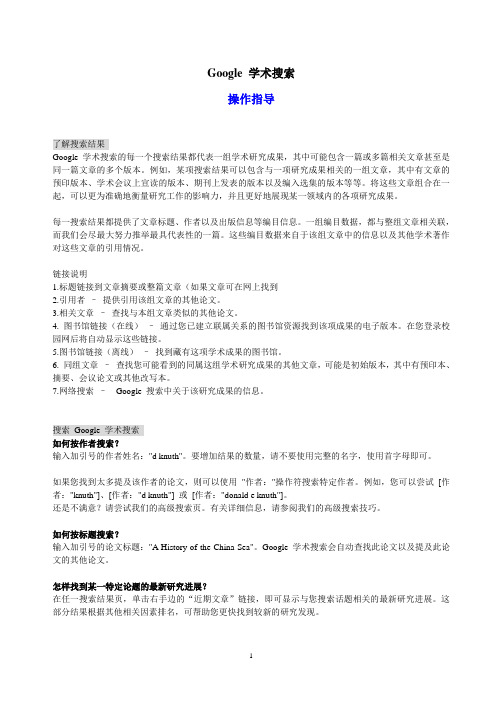
Google 学术搜索操作指导了解搜索结果Google 学术搜索的每一个搜索结果都代表一组学术研究成果,其中可能包含一篇或多篇相关文章甚至是同一篇文章的多个版本。
例如,某项搜索结果可以包含与一项研究成果相关的一组文章,其中有文章的预印版本、学术会议上宣读的版本、期刊上发表的版本以及编入选集的版本等等。
将这些文章组合在一起,可以更为准确地衡量研究工作的影响力,并且更好地展现某一领域内的各项研究成果。
每一搜索结果都提供了文章标题、作者以及出版信息等编目信息。
一组编目数据,都与整组文章相关联,而我们会尽最大努力推举最具代表性的一篇。
这些编目数据来自于该组文章中的信息以及其他学术著作对这些文章的引用情况。
链接说明1.标题链接到文章摘要或整篇文章(如果文章可在网上找到2.引用者–提供引用该组文章的其他论文。
3.相关文章–查找与本组文章类似的其他论文。
4. 图书馆链接(在线)–通过您已建立联属关系的图书馆资源找到该项成果的电子版本。
在您登录校园网后将自动显示这些链接。
5.图书馆链接(离线)–找到藏有这项学术成果的图书馆。
6. 同组文章–查找您可能看到的同属这组学术研究成果的其他文章,可能是初始版本,其中有预印本、摘要、会议论文或其他改写本。
7.网络搜索–Google 搜索中关于该研究成果的信息。
搜索Google 学术搜索如何按作者搜索?输入加引号的作者姓名:"d knuth"。
要增加结果的数量,请不要使用完整的名字,使用首字母即可。
如果您找到太多提及该作者的论文,则可以使用"作者:"操作符搜索特定作者。
例如,您可以尝试[作者:"knuth"]、[作者:"d knuth"] 或[作者:"donald e knuth"]。
还是不满意?请尝试我们的高级搜索页。
有关详细信息,请参阅我们的高级搜索技巧。
如何按标题搜索?输入加引号的论文标题:"A History of the China Sea"。
写论文资料搜索必备(外文常用学术搜索引擎)

写论文资料搜索必备!放弃GOOGLE,放弃BAIDU的垃圾信息吧!!!写ESSAY跟RESEACH PAPER一定用到的17个网站~必收藏文章~!来源:卫奇的日志1、/虽然还是Beta版,但个人已觉得现在已经是很好很强大了,Google学术搜索滤掉了普通搜索结果中大量的垃圾信息,排列出文章的不同版本以及被其它文章的引用次数。
略显不足的是,它搜索出来的结果没有按照权威度(譬如影响因子、引用次数)依次排列,在中国搜索出来的,前几页可能大部分为中文的一些期刊的文章。
2、Scirus 是目前互联网上最全面、综合性最强的科技文献搜索引擎之一,由Elsevier科学出版社开发,用于搜索期刊和专利,效果很不错!Scirus覆盖的学科范围包括:农业与生物学,天文学,生物科学,化学与化工,计算机科学,地球与行星科学,经济、金融与管理科学,工程、能源与技术,环境科学,语言学,法学,生命科学,材料科学,数学,医学,神经系统科学,药理学,物理学,心理学,社会与行为科学,社会学等。
3、/BASE是德国比勒费尔德(Bielefeld)大学图书馆开发的一个多学科的学术搜索引擎,提供对全球异构学术资源的集成检索服务。
它整合了德国比勒费尔德大学图书馆的图书馆目录和大约160 个开放资源(超过200 万个文档)的数据。
4、http://www.vascoda.de/Vascoda是一个交叉学科门户网站的原型,它注重特定主题的聚合,集成了图书馆的收藏、文献数据库和附加的学术内容。
5、/与google比较了一下发现,能搜索到一些google搜索不到的好东东。
它界面简洁,功能强大,速度快,YAHOO、网易都采用了它的搜索技术。
各位可以一试。
6、Google在同一水平的搜索引擎。
是推出的,Web result部分是基于Google 的,所以保证和Google在同一水平,另外增加了Amazon的在书本内搜索的功能和个性化功能:主要是可以记录你的搜索历史。
谷歌学术 添加引用格式

谷歌学术添加引用格式
在谷歌学术中添加引用格式,具体操作如下:
1. 打开谷歌学术,搜索你想引用的论文或文章。
2. 在搜索结果中找到你需要引用的文章,点击右侧的引用按钮(Cite)。
3. 引用选项框中会列出几种常见的引用格式,如MLA、APA、Chicago 等。
选择适合你的引用风格。
4. 检查引用格式是否正确,特别是作者、出版年、文章标题等核心信息是否正确。
5. 复制引用格式后粘贴到你的文献中,记得在引用格式前添加编号,以便在文献列表中快速定位。
以下是一个使用APA格式的中文引用示例:
吴宗宪, & 钱蓉裕. (2017). 移动互联网时代下的品牌传播机制分析 [An analysis of brand communication mechanisms in the era of mobile Internet]. 大众传播学刊, (07), 38-44.。
Google Scholar 学术搜索引擎

科大SFX服务界面
SFX:链接服务器,把 在数据库中查找到的结 果与本馆所拥有的资源 联系在一起
精确查找文献 的年卷期
此文献在科大图书 馆的馆藏情况
设置添加Tsinghua,Harvard图书馆后
清华SFX服务界面
查询其它高校的图书馆 馆藏信息,方便馆际互 借或文献传递
多了两个收录该文 献的来源
直接下载 PDF文档
Google Scholar的数据整合
输入“graphene*” 进行检索
点击查看不同 的来源信息
每条检索结果中其中一个来源地址作为显示页面,点击 “所有版本”后显示其余的不同来源信息
同一文献的不同信息来源
引用
IEEE机构的数据库 Harvard大学 AIP数据库
伊朗德黑兰大学 有全文!
GS对检索结果只能按相关度排序
缺乏按时间排序,用户要获取最新内容相关的文献困难, 具有随机性和偶然性 没有结果分析功能,用户无法对检索结果进行信息再挖掘
GS定题跟踪服务落后
WOS跟踪提示功能:
➢ 引文提示:关注的文章被新的文章所引用 ➢ 作者提示:关注的作者的研究进展 ➢ 主题提示:关注的主题有新的文章发表
Google Scholar的全文来源
付费资料库
须图书馆购买,ACS, Elsevier, Wiley
作者或所属机构放置在网络上
个人Blog,空间,大学:.edu .ac
开放获取(Open Access)网站
arXiv:免费电子预印本文献库
利用Google Scholar获取全文
arXiv
Google Scholar 学术搜索引擎
化物所之Google Scholar小组
报告人: SC10003005 陈政 其他小组成员: SC10003033 杜燕
Google学术搜索及其检索的技巧
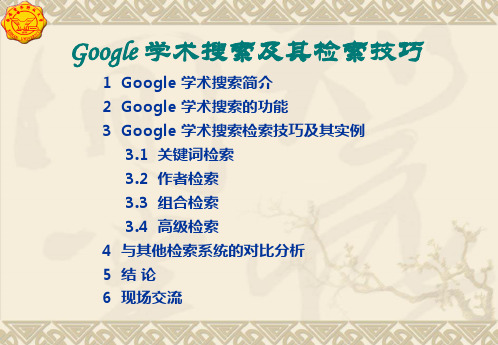
论著被引信息链接结果--引证文献
论著被引信息链接结果--引证文献(续)
论著被引信息链接结果--引证文献
3.3 组合检索
可以将作者与关键词、作者与出版物名称、关键词与出版物名称 等组合起来进行检索,提高查准率。例如,搜索 [Friedman regression] (弗里德曼 回归) 会返回以“regression”为主题的, 由名为“Friedman”的人撰写的文章。 如果某个词既是人名也是普通名词,最好使用“作者:”操作符。 该操作符只影响到紧挨其后的搜索字词,因此“作者:”和搜索字 词之间不能有空格。例如,[作者:flowers] (人名弗劳尔,也是 花的意思) 会返回由名为“Flowers”的人撰写的文章,而 [flowers - 作者:flowers] 会返回关于花的文章,而忽略由名为 “Flowers”的人撰写的文章(搜索字词之前的减号 (-) 会排除包 含这一搜索字词的搜索结果)。 搜索[段宝岩 射电望远镜 中国机械工程 ]结果如下:
3 Google 学术搜索检索技巧及其实例
3.1 关键词检索
直接在输入框中输入关键词,可以给关键词加引号(精确检 索),也可以用空格将两个关键词逻辑与组配检索,还可以用 OR算符连接关键词进行逻辑或组配检索。例如,我们需要检 索多媒体信息资源管理方面的信息,可以构造检索提问式如下: (IRM OR “Information Resources Management”) Multimedia “信息资源管理” “多媒体” 或者 “多媒体信息资源管理” 检索结果如下:
3.2 作者检索
输入加引号的作者姓名:“段宝岩” 或者 “Duan Baoyan”。要增加结果的数量,请不an B Y” 。
如果找到太多提及该作者的论文,则可以使用 "作者:"操 作符搜索特定作者。例如,可以尝试 [作者:"段宝岩"]、[作 者:" Duan Bao-yan "] 或 [作者:" Duan B Y "]。 如果还是不满意?请尝试高级搜索功能。有关详细信息,请参 阅高级搜索技巧。
Google 学术搜索(Google Scholar)使用技巧
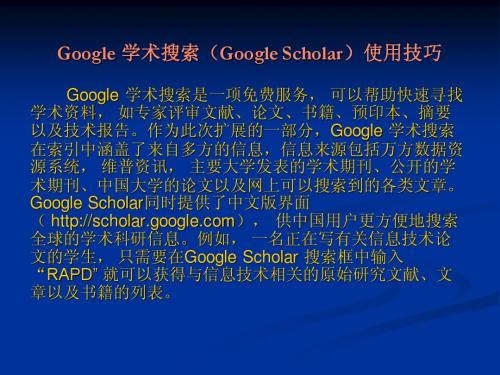
您可以使用将作者全名加引号的操作符, 来进一步缩小搜 索范围。尽量使用首字母而不要使用全名,因为Google 学术 搜索编入索引的某些来源仅提供首字母。例如: 要查找 Donald E. Knuth (唐纳德?E. 克努特), 您可以尝试[作者: “d knuth” ]、[作者:“de knuth” ]或[作者: “donald e knuth” ]。 2.2 标题搜索 采用学术著作、论文或报告的标题作为关键词进行Google 学术搜索, 可以查找到更准确的学术信息。标题搜索的具体操 作是, 【Google 学术搜索】页面的【搜索】编辑框中输入加 英文引号的标题(“DynamicPower Management for Embedded Systems” ),然后单击【搜索】按钮, Google 将会返回所示 的学术信息。
图1 Google 高级学术搜索
图2 “Springer” 有关“Diabetes” 的出版物搜索结果
此外, 采用Google 高级搜索功能, 也能实现良好的搜索 效果, 如在选择好了关键词之后, 这些简单的搜索语法已经 能解决绝大部分问题了, 不过, 如果想更迅速更贴切找到需 要的信息, 你可采取如下方式: 2.6.1 对搜索的网站进行限制 “site” 表示搜索结果局限于某个具体网站或者网站频道, 如果是要排除某网站或者域名范围内的页面, 只需用“- 网站/ 域名”。例如, 搜索中文教育科研网站() 上的页面, 你可以使用以下搜索格式: “关键词site:”。 2.6.2 在某一类文件中查找信息 “filetype:” 是Google 开发的非常强大实用的一个搜索语 法。也就是说, Google 不仅能搜索一般的文字页面, 还能对 某些二进制文档进行检索。目前,Google 已经能检索微软的 Office 文档如.xls、.ppt、.doc, .rtf, WordPerfect 文档, Lotus1-2-3 文档,Adobe 的.pdf 文档, ShockWave 的.swf 文 档(Flash动画) 等。例如, 搜索关于某方面的pdf 文档, 你 可以使用以下搜索格式: “关键词filetype:pdf”。
Google搜索引擎和专业搜索工具的使用指南说明书

GETTING THE MOST OUT OF:Google is the world’s most widely used search engine. In addition to its web search function, Google also offers many specialized services such as Google Scholar, Book Search, Image Search, News Search, and Maps.IntroductionThis guide explains how to effectively use the Google search engine (https://www.google.ca/) and some of its specialized search tools to find information online.Points to remember:1.No single search engine searches the entire Web. For the best results, try your search in morethan one search engine.2.Many scholarly journal articles cannot be found by search engines. This includes GoogleScholar. To find and access scholarly journal articles reliably, use the library’s databases.3.Websites often lack the quality controls that are used in publishing other types of resources(e.g., scholarly journals), so you should always evaluate internet resources for quality andappropriateness for your research. To learn more, refer to the Library’s guide on evaluatinginternet resources.4.Just because a result is the top hit on Google, this does not mean it is credible, reliable oraccurate. Google’s sorting is based on relevancy – to you, your search, your location, your past searches… – not quality.5.Your search results are affected by personalized information such as your location and pastsearch history. Google’s algorithms guess what information you are looking for, which can result in a “filter bubble”.For example, you may not be shown results that disagree with what Google perceives as your viewpoints or ideologies. To see this personalization in action, try comparing your search results from your regular browser to that of a private or incognito window! You might also try searching with , a search engine that shows the same search results to every user.6.Some of your search results may include advertisements (denoted by a small “Ad” to the left ofthe URL). These are from companies that pay Google to advertise their products or servicesand are not an indication that the site is a credible source.Basic SearchGoogle search has some customizable features and will perform differently depending upon which settings are selected.Google has a built-in Autocomplete feature that is not possible to turn off. As you are typing your query, Google makes predictions about possible search terms for you. However, it is not necessary to choose any of the predictions.Google has an option to include Private results that can look for tailored content for you from other Google products you use, like Gmail or Google Calendar. This only works if you are signed into your Google account while searching, and it can be turned off by going into Settings and selecting Do not use private results .Searching with Google:To perform a search with Google, enter your keywords into the search box.When you have entered your keywords, either click on one of the Autocomplete predictions, hit Enter on your keyboard, or click on the search button on the browser.Search termsAutocomplete predictions Voice Search:To use Voice Search, click on the microphone icon in the search bar and follow the instructions. When choosing search terms:•Be specific and try to include at least 2 keywords that best describe what you are trying tofind. For example, to find apartments for rent in Halifax, you could search:•Avoid common words such as “how”, “of”, and “where” because these stop words will normallybe excluded from a search. If stop words occur in a common phrase or title such as Of Mice and Men , use quotation marks to search for the exact set of words:•Select appropriate terminology for your query and be aware that different terms may imply a certain bias:e.g., searching “oil sands” will retrieve results from Alberta Energy and other members ofthe oil industry, whereas a search for “tar sands” will retrieve results from Greenpeaceand other environmental advocacy organizations.•Word order can affect your search results. Words should be ordered in the way you would expect them to appear in a search result or how they appear in natural phrases:e.g., “world war” retrieves results about the First and Second World Wars, whereas “warworld” retrieves results about a DC comic book series.Writing a Search QueryWhen searching, it helps to understand how Google interprets what you enter:•Google searches for pages that contain as many of your terms as possible. However, it may return results without some of the terms you entered.o If a result is missing a search term, below its entry you will see: “Missing: term”•Google searches are not case sensitive.•Google automatically searches for variations of some search terms, e.g., “knit”, “knits”, “knitting”, etc. To prevent searching for variations of a term, enclose it in quotation marks.•You don’t need to type AND between your search terms.Basic Search OperatorsORe.g., canine OR dog OR puppy Finds pages that contain one or more of the search terms.–e.g., titanic –moviee.g., biology –site: Exclude particular words, phrases or sites from your results.Google’s version of the “NOT” operator.Can be combined with other special operators, such as site:“ ”e.g., “life of pi”Finds pages that contain the phrase exactly as typed between thequotation marks.*e.g., “* for an * makes thewhole world blind” Use the asterisk as a wildcard for unknown terms. Phrase search with quotations for variations of an exact phrase.Advanced SearchTo use advanced search, click on Settings in the bottom-right of the Google homepage and select Advanced Search from the pop-up menu.If you are in a search already, Settings will appear below the search bar. Or, visithttps://www.google.ca/advanced_search .First, type your search terms into the relevant search boxes:Then, refine your search by selecting one or more limit options, which are listed next to the searchboxes.Refining Your SearchIf your searches are retrieving too many irrelevant hits, use these special operators to increase the relevancy of your results:Special Search Operatorsintitle: Restrict your results to documents with a specified search term in the titlee.g., forensics intitle:universityallintitle: Restrict your results to documents with all of your search terms in the titlee.g., allintitle:google tutorialsite: Restrict your results to documents within a specified website or domaine.g., chemistry site:www.smu.cainurl: Restrict your results to documents with a specified search term in the URLe.g., book review inurl:librarydefine: Google tries to define the term first using dictionaries or encyclopaedias.e.g., define:deep webfiletype: Restrict your results to specific file types using file extensionse.g., syllabus filetype:docxe.g., thesis filetype:pdfrelated: Restrict your results to find webpages with similar content to a specific URLe.g., related:http://www.smu.ca/Note: do not place a space after the colon when using special operators.Google Search Results & Other Search ToolsYour searches could retrieve a variety of content, including links to books, news, images, etc. To limit your results to a particular format, e.g., images, simply select the Images tab located below the search bar on the results page. It is important to note that the placement of these links may change with every search. In the example below, Google Books results are hidden under the More tab, alongside Shopping, Flights, Finance, and Personal.Google Scholar does not appear in the tab below the search bar or in the “More” tab. Instead, Google may suggest “Scholarly articles for Your Search ”. This link will take you to Google Scholar .Google Books , Scholar , Images , News , and Maps also have their own dedicated sites and searchinterfaces. You can use the square “apps” button to access these products. The “apps” button appears at the top right hand side of many Google products, and displays a selection of “popular” apps by default. Image SearchNot to be confused with Google Photos, which is a tool for syncing, editing and sharing pictures.This feature allows you to search for images throughout the web. Enter keywords into the search box and if Google finds any matches to your query, it will display thumbnail pictures of the matches. Click on the thumbnails to view the full sized pictures.You can also upload an image, or paste an image’s URL, to search the web for images that are visually similar to that image. This can be useful for identifying the provenance or original source of an image.News On the Google News homepage, Google sorts its top news stories into various categories (e.g.,Canada, Health, etc.). Thousands of news sources, including traditional news sites, blogs, satire, and press releases are indexed by Google News . While many articles are free to access, some sources have paywalls and will limit the number of articles you are able to view without a subscription.Google News will also alter its contents based on your past searches and preferences. You may notice your favourite news websites appearing more frequently than ones you click on less often.Book SearchThis feature allows you to search the full-text of many books. Google has amassed a collection of scanned books through its affiliations with some prominent libraries, as well as through a partner program with publishers and authors who wish to have their books searchable by the public.Click on a book title and you will see basic bibliographic information about the book. If available, the full-text of the book will be viewable and available for download as a PDF. For some books you will onlybe able to “preview” some full-pages of titles. Other titles only offer “snippet” views of a few lines of text, showing full-text search results in context.If on campus, select the Find in a library (under Get thisbook in print) link and you will be directed to WorldCatLocal for SMU. Here you will be able to see if the item isavailable at the Patrick Power Library or through anotherNovanet library.Search within the full-text of the book for particular termsor phrases.MapsWith Google Maps, you can search for maps and directions to various locations (e.g., cities, streets, or restaurants). Browse streetscapes and explore landmarks as 360-degree images in Street View or try the Satellite view to see 3D imagery of the environment. Also try out Google’s related service, Google Earth, which offers features including a Maps Gallery, along with Sky, Moon, Ocean, and Mars viewing modes.Google ScholarGoogle Scholar is a specialized search engine developed for researchers and academics. Its index includes articles, books, patents, court opinions, scientific pre-prints, and government documents from many publishers and academic fields. With Google Scholar, you can search for scholarly literature on your topic – often in full-text – and then retrieve the items from the Patrick Power Library. See the Library’s Google Scholar Guide for more information.For more help…Don’t forget to check out the complete lists of online tutorials and library guides. You are always welcome to stop by the Research Help desk for further assistance with your assignments.Phone: (902) 420-5544Email: ***************。
常用的学术搜索引擎及网站

首推Google scholar,然后是下面是一些具体评价1、Google学术搜索:/虽然还是Beta版,但个人已觉得现在已经是很好很强大了,Google学术搜索滤掉了普通搜索结果中大量的垃圾信息,排列出文章的不同版本以及被其它文章的引用次数。
略显不足的是,它搜索出来的结果没有按照权威度(譬如影响因子、引用次数)依次排列,在中国搜索出来的,前几页可能大部分为中文的一些期刊的文章。
2、全能搜:/后起之秀,科研人员的良好助手,上此网站的90%是从事科研的学生与老师。
其词典搜索集成了目前市面上最好的在线英汉写作及科研词典,用此搜索引擎写作英文论文相当方便;其文献搜索集成了目前最优秀的数据库。
3、Scirus :Scirus是目前互联网上最全面、综合性最强的科技文献搜索引擎之一,由Elsevier科学出版社开发,用于搜索期刊和专利,效果很不错!Scirus覆盖的学科范围包括:农业与生物学,天文学,生物科学,化学与化工,计算机科学,地球与行星科学,经济、金融与管理科学,工程、能源与技术,环境科学,语言学,法学,生命科学,材料科学,数学,医学,神经系统科学,药理学,物理学,心理学,社会与行为科学,社会学等。
4、BASE :/BASE是德国比勒费尔德(Bielefeld)大学图书馆开发的一个多学科的学术搜索引擎,提供对全球异构学术资源的集成检索服务。
它整合了德国比勒费尔德大学图书馆的图书馆目录和大约160 个开放资源(超过200 万个文档)的数据。
-5、Vascoda :http://www.vascoda.de/Vascoda是一个交叉学科门户网站的原型,它注重特定主题的聚合,集成了图书馆的收藏、文献数据库和附加的学术内容。
6、Goole :/与google比较了一下发现,能搜索到一些google搜索不到的好东东。
它界面简洁,功能强大,速度快,YAHOO、网易都采用了它的搜索技术。
各位可以一试。
7、A9 :Google在同一水平的搜索引擎。
googlescholar

googlescholar1 相关介绍1.1 概览网站类型bibliographic database注册optional持有者Google创始者Google当前版本betagoogle scholar Google Scholar (谷歌学术搜索,简称GS)是一个可以免费搜索学术文章的网络搜索引擎索引了出版文章中文字的格式和科目,能够帮助用户查找包括期刊论文、学位论文、书籍、预印本、文摘和技术报告在内的学术文献,内容涵盖自然科学、人文科学、社会科学等多种学科。
BETA版本于2004年11月发行,收录欧洲和美洲地区最大学术书版商们共同评定(peer-reviewed)的文章,这在一般搜索引擎大部分是被忽略的。
这个功能和Elsevier, CiteSeerX和getCITED所提供的免费概况查阅是类似的。
它也与Elsevier的 Scopus以及Thomson ISI的 Web of Science网络科学中的订阅工具类似。
谷歌学术的广告标语是“站在巨人的肩膀上”这也是对所有学术工作者的肯定,他们在过去的几个世纪中贡献了各自领域的知识,并为新的智慧成就奠定了基础。
目前,Google公司与许多科学和学术出版商进行了合作,包括学术、科技和技术出版商,例如ACM、Nature、IEEE、OCLC等。
这种合作使用户能够检索特定的学术文献,通过Google Scholar从学术出版者、专业团体、预印本库、大学范围内以及从网络上获得学术文献,包括来自所有研究领域的同级评审论文、学位论文、图书、预印本、摘要和技术报告。
1.2 用途从检索情况分析, Google学术搜索可以有如下用途:1、了解有关某一领域的学术文献。
由于收录范围限于学术文献,将屏蔽掉网上很多不相关信息。
2、了解某一作者的著述,并提供书目信息(引用时必需的图书出版信息或期刊论文的刊名、刊期信息)。
可直接在网上搜索原文、文摘等;如果是图书,还可通过Library Search(例如OCLC的Open WorldCAT)检索附近图书馆的收藏。
如何利用google进行学术搜索

如何利用google进行学术搜索摘要随着科学研究所依赖的各种信息资源的大规模网络化数字化,搜索引擎逐渐成为网络时代的最快捷方便的个性化信息服务系统。
Google成为目前最受欢迎的搜索引擎,本文全面详细总结了利用Google进行专题信息检索的方法和技巧。
关键词个性化信息服务信息检索专题检索搜索Google 方法技巧目前,科学研究依赖的各种信息资源,包括文摘索引、期刊论文、预印本、技术报告、学位论文、会议论文、以及部分重要工具书和专著等在内的主流科研信息资源已经逐步数字化,开始形成一个逐步完善的数字化信息资源空间,科研人员可以通过网络跨时空的进行专题信息检索,获取相关科研文献资源[1]。
基于网页内容的全文检索技术是搜索引擎的核心,搜索引擎也是全自动的软件服务。
从目前来看,搜索引擎,尤其是Google已成为网络时代最快捷方便的个性化信息服务系统和服务方式。
[2]1 Google成为目前最受欢迎的搜索引擎Google()是当今一个优秀的搜索引擎,其功能强大、特点突出、技术先进和服务优良,它在业界评测中获得多项大奖,各大引擎竞相模仿其功能和特色。
Google非中国本土公司,但它支持中文搜索,其中文搜索引擎是收集亚洲网站最多的搜索引擎之一,国内使用其独立搜索引擎的人数急剧增长。
目前,全世界访问量最大的4个网站中,3家采用了Google的搜索技术,80%的互联网搜索是通过Google或使用Google技术的网站完成的。
目前Google每个月接待来自世界各地的超过2800万独立访问者,全球网民通过Google可以使用86种语言,搜索30多亿个网页及其网页快照,以及4亿多张图片,每个月Google被用户使用的时间为1500万小时左右。
据搜索引擎观察者网络杂志统计结果显示,至2002年10月份,网民使用Google的时间量每月达到1610万小时;相比之下,雅虎只吸引了660万小时,微软MSN仅有520万小时[3]。
如何使用Google Scholar查找外文文献的技巧和方法

如何使用Google Scholar查找外文文献的技巧和方法Google Scholar是Google于2004年底推出的专门面向学术资源的免费搜索工具,能够帮助用户查找包括期刊论文、学位论文、书籍、预印本、文摘和技术报告在内的学术文献,内容涵盖自然科学、人文科学、社会科学等多种学科。
Google Scholar的资料来源主要有以下几方面的资料来源:1. 网络免费的学术资源:随着开放获取运动(Open Access)的开展,有许多机构网站,特别是大学网站汇聚了大量本机构研究人员的学术成果,包括已经发表的论文,论文的预印本、工作报告、会议论文、调研报告等等,并向所有人提供免费公开获取。
同时,有许多个人网站也是学者个人成果的发布网站,有许多有价值的学术文献。
这些资源有很多在普通Google 搜索中可以搜索到的,现在Google将这部分资源集中到Google Scholar中,以提供更加专指的搜索结果。
2. 开放获取的期刊网站:许多传统的期刊出版商也加入到开放获取期刊行列,如:英国牛津大学出版社允许全球科研人员在线免费搜索访问2002年以来牛津大学作者出版的学术论文。
斯坦福大学的High wire出版社将其出版的期刊提供全文免费网络服务,截止到2004年5月2日已开放全部1741023篇论文的716615篇,被称为全球最大的免费全文学术论文数据库。
这些开放获取的期刊网站的内容已基本为Google Scholar所包括,可以通过Google Scholar检索并提供全文的链接。
如:Google Scholar已包括High Wire的94%。
3. 付费电子资源提供商:有许多电子资源提供商也与Google合作,将其电子数据库的索引或文摘提供给Google Scholar,据研究表明:Google已覆盖了JSORE的30%;SpringerLink 的68%,Cambridge Journals Online的94%,Sociological Abstracts的44%等。
Google学术搜索使用技巧

9
检索界面-2
输入检索词、词组
信息素养-培训课件
2013-2014年
10
检索界面-3
按学科、年度、学 位精确检索范围
信息素养-培训课件
下载PDF全文
2013-2014年
11
国内学位论文检索
国内学位论文数据库
中国知网(CNKI)学位论文数据库(全文) 万方数据 — 中国学位论文数据库(全文) CALIS学位论文(文摘)
库
多数有全文,但论文列表前有“vt”标记的,不能访问全文。
需支付国际流量费。
:///theses/browse/ Texas Digital Library 德克萨斯数字图书馆学位论文数据库,提供德州农机大学、
德州州立大学、德州理工大学、德州大学自2002年以来的 部分博硕士学位论文,可查阅全文。开放登录,需支付国际 流量费。
香港科技大学电子论文数据库,提供香港科技大学
1994年以来博硕士论文,大部分全文。
://-theses
HKLIS-Dissertations and Theses Collections(DTC)
香港七所大学及澳门大学的博硕士论文,部分全文。
://
信息素养-培训课件
2013-2014年
32
国内免费学位论文资源-3
内容具有独创性
探讨的问题较专深, 阐述详细; 理论性、系统性强,具有一定的独创性。
出版形式特殊,系统收集较难
一般不通过出版社正式出版; 由学位授予单位或少数特定机构收藏,搜集起来较困难。
信息素养-培训课件
2013-2014年
4
学位论文资源的重要性
学位论文是学术研究一种特殊类型的学术信息资源
